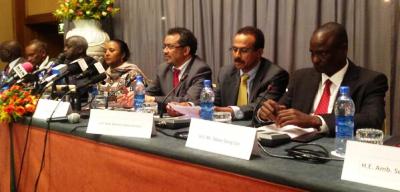Direct talks between South Sudan rivals to commence Sunday
January 4, 2014 (ADDIS ABABA / JUBA) – Ethiopian officials said late on Saturday that face-to-face talks between South Sudan’s warring parties would begin on Sunday.

The two negotiating teams representing president Salva kiir and his former deputy Riek Machar, currently staying at Addis Ababa’s Sheraton Hotel, were initially set for face-to-face discussions on 1 January.
The talks have, however, faced a series of delays as the government declined to accept some of Machar’s preconditions, which included the release of nine political prisoners and a mechanism put in place to monitor any ceasefire.
The head of the rebel negotiating team, Taban Deng Gai – a former Unity state governor who was sacked by Kiir last year – repeated the rebels preconditions on Saturday.
“We ask for the release of political detainees and free movement and political space for them to join us here” Gai said in Addis Ababa ahead of the direct talks.
So far the government has agreed to release eight of the 11 high profile members of the ruling party arrested after fighting broke out within the army on 15 December.
Kiir, who has accused Machar and others of attempting to overthrow him, has declared a state of emergency in Jonglei and Unity state where large parts of the army defected following reports that civilians were targeted on the basis of their ethnicity during fighting in Juba.
Former governor Gai and the others who have since rebelled against the government and those who opposed Kiir have denied that there was any attempted coup in Juba.
Gai demanded that the state of emergency be lifted in the two states of the country.
The government delegation, however, argued that they went to Addis to discuss ceasefire, not the release of the SPLM opposition leaders currently in jail.
Earlier on Saturday, rebel representatives told reporters that direct talks had been delayed until an agenda that would bridge their differences is set out by the Inter-Governmental Authority on Development (IGAD) mediators and was accepted by both parties.
The IGAD is attempting to broker a deal to end weeks of conflict that has killed over 1,000 people and forced tens of thousands to flee their home.
The two sides have so far only held separate talks with IGAD mediators, who are trying to lay the ground for face-to-face talks.
Meanwhile heavy fighting has continued between the army and soldiers who have mutinied. Also government claims that the army is advancing to regain control of the capitals of Jonglei and Unity state – Bor and Bentiu respectively – have been strongly denied by the rebels.
Machar has claimed his forces are moving towards the capital Juba, a claim dismissed by the government.
The leader of the South Sudanese delegation, Nhial Deng Nhial, told Sudan Tribune that there were “no direct discussions” on Saturday, but added that his team had met with mediators.
He did not, however, say whether the mediators have set a time for face-to-face talks to commence.
Multiple sources with direct knowledge of the negotiations told Sudan Tribune on Saturday that the two sides have submitted their positions to the mediators.
After studying the positions of both sides, sources say, the chief mediator, Seyoum Mesfin – a former Ethiopian foreign minister – decided to bring the chief negotiators together to harmonise and streamline the agenda.
After an hour of discussions, Nhial and Gai decided to narrow the agenda to only cessation of hostilities, with other issues to be addressed after a ceasefire is reached.
AU WELCOMES TALKS
Meanwhile, the Chairperson of the African Union Commission has welcomed the beginning of talks between delegation from both parties as advocated for by its Peace and Security Council (PSC) on 30 December and the IGAD summit of 27 December.
“Not a single day can be lost in the search for peace in South Sudan. Stopping the fighting in South Sudan is not only a humanitarian imperative, but also a strategic necessity, in order to halt the rapid descent of Africa’s newest nation into collapse”, Nkosazana Dlamini-Zuma said in a statement.
“An immediate end to hostilities and the beginning of political dialogue, in line with the relevant provisions of the PSC Communiqué of 30 December 2013, is not only Africa’s demand and that of the international community, but is also the plea of the people of South Sudan”, it added.
Zuma urged leaders of South Sudan to abandon any attempt to seek military advantage prior to entering negotiations, and instead to declare a cessation of hostilities and engage in unconditional, inclusive and holistic political talks in good faith.
(ST)
